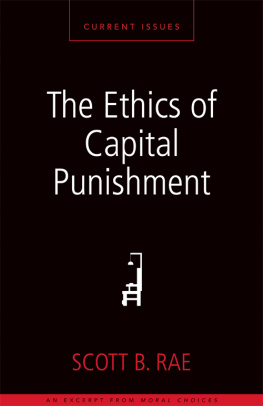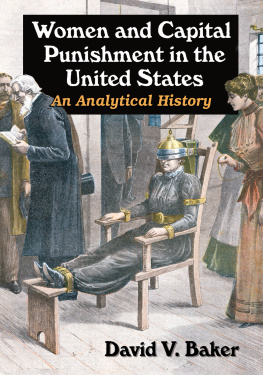How Ethical Systems Change: Lynching and Capital Punishment
Sheldon Ekland-Olson and Danielle Dirks
Slavery, lynching, and capital punishment were interwoven in the United States. By the mid-twentieth century these connections gave rise to a small but well-focused reform movement. Biased and perfunctory procedures were replaced by prolonged trials and appeals, which some found messy and meaningless. DNA profiling clearly established innocent persons had been sentenced to death. The debate over taking life to protect life continues. This book is based on a hugely popular undergraduate course taught at The University of Texas, and is ideal for those interested in criminal justice, social problems, social inequality, and social movements.
Sheldon Ekland-Olson joined The University of Texas at Austin after completing his graduate work at the University of Washington in Seattle and Yale Law School. He is currently the Bernard and Audre Rapoport Centennial Professor of Liberal Arts. He served for five years as Dean of the College of Liberal Arts and then for eight years as Executive Vice President and Provost of the university. He has authored or co-authored several books and numerous articles on criminal justice, prison reform, and capital punishment. Widely recognized for his commitment to teaching undergraduates, he is the recipient of numerous teaching awards. His current interests are reflected in the book Who Lives, Who Dies, Who Decides? (Routledge, 2012).
Danielle Dirks is an Assistant Professor in the Department of Sociology at Occidental College in Los Angeles, California. She completed her doctoral work at The University of Texas at Austin, with a focus on American capital punishment and the rise of closure as a death penalty rationale in the post-Furman era. Her scholarly interests include crime, law, and deviance, and racial and ethnic relations in the United States.
Framing 21st Century Social Issues
The goal of this new, unique Series is to offer readable, teachable thinking frames on todays social problems and social issues by leading scholars. These are available for view on http://routledge.customgateway.com/routledge-social-issues.html.
For instructors teaching a wide range of courses in the social sciences, the Routledge Social Issues Collection now offers the best of both worlds: originally written short texts that provide overviews to important social issues as well as teachable excerpts from larger works previously published by Routledge and other presses.
As an instructor, click to the website to view the library and decide how to build your custom anthology and which thinking frames to assign. Students can choose to receive the assigned materials in print and/or electronic formats at an affordable price.
Available
Body Problems
Running and Living Long in a Fast-Food Society
Ben Agger
Sex, Drugs, and Death
Addressing Youth Problems in American Society
Tammy Anderson
The Stupidity Epidemic
Worrying About Students, Schools, and Americas Future
Joel Best
Empire Versus Democracy
The Triumph of Corporate and Military Power
Carl Boggs
Contentious Identities
Ethnic, Religious, and Nationalist Conflicts in Todays World
Daniel Chirot
The Future of Higher Education
Dan Clawson and Max Page
Waste and Consumption
Capitalism, the Environment, and the Life of Things
Simonetta Falasca-Zamponi
Rapid Climate Change
Causes, Consequences, and Solutions
Scott G. McNall
The Problem of Emotions in Societies
Jonathan H. Turner
Outsourcing the Womb
Race, Class, and Gestational Surrogacy in a Global Market
France Winddance Twine
Changing Times for Black Professionals
Adia Harvey Wingfield
Why Nations Go to War
A Sociology of Military Conflict
Mark P. Worrell
How Ethical Systems Change: Eugenics, the Final Solution, Bioethics
Sheldon Ekland-Olson and Julie Beicken
How Ethical Systems Change: Abortion and Neonatal Care
Sheldon Ekland-Olson and Elyshia Aseltine
How Ethical Systems Change: Tolerable Suffering and Assisted Dying
Sheldon Ekland-Olson and Elyshia Aseltine
How Ethical Systems Change: Lynching and Capital Punishment
Sheldon Ekland-Olson and Danielle Dirks
DIY: The Search for Control and Self-Reliance in the 21st Century
Kevin Wehr
Nuclear Family Values, Extended Family Lives
Natalia Sarkisian and Naomi Gerstel
Disposable Youth, Racialized Memories, and the Culture of Cruelty
Henry Giroux
Forthcoming
Future Ethics
Charles Lemert and Sam Han
Oversharing: Presentation of Self in the Internet Age
Ben Agger
Sociology of Mindfulness
Jodi OBrien
Foreign Remedies: What the Experience of Other Nations Can Tell Us about Next Steps in Reforming U.S. Health Care
David Rochefort and Kevin Donnelly
Its the Economy, Stupid
Stanley Aronowitz
HIV/AIDS: A Global Social Problem
Carrie Foote
Google Bombs, Astroturf, and Cloaked Sites
Jessie Daniels
Girls with Guns
France Winddance Twine
Torture and Rights
Lisa Hajjar
Are We Coddling Prisoners?
Benjamin Fleury-Steiner
Sociology of Terror, Terrorism, and Terrorists
Mark Worrell
First published 2012
by Routledge
711 Third Avenue, New York, NY 10017
Simultaneously published in the UK
by Routledge
2 Park Square, Milton Park, Abingdon, Oxon OX14 4RN
Routledge is an imprint of the Taylor & Francis Group, an informa business
2012 Taylor & Francis
The right of Sheldon Ekland-Olson and Danielle Dirks to be identified as authors of this work has been asserted by them in accordance with sections 77 and 78 of the Copyright, Designs and Patents Act 1988.
All rights reserved. No part of this book may be reprinted or reproduced or utilised in any form or by any electronic, mechanical, or other means, now known or hereafter invented, including photocopying and recording, or in any information storage or retrieval system, without permission in writing from the publishers.
Trademark notice: Product or corporate names may be trademarks or registered trademarks, and are used only for identification and explanation without intent to infringe.
Library of Congress Cataloging in Publication Date
Ekland-Olson, Sheldon, 1944
How ethical systems change : lynching and capital punishment / Sheldon Ekland-Olson. 1st ed.
p. cm. (Framing 21st century social issues)
1. PunishmentUnited StatesHistory. 2. LifeMoral and ethical aspects.
3. Social justiceUnited StatesHistory. 4. Discrimination in capital punishmentUnited StatesHistory. 5. LynchingUnited StatesHistory.
6. Capital punishmentUnited StatesHistory. I. Title.









